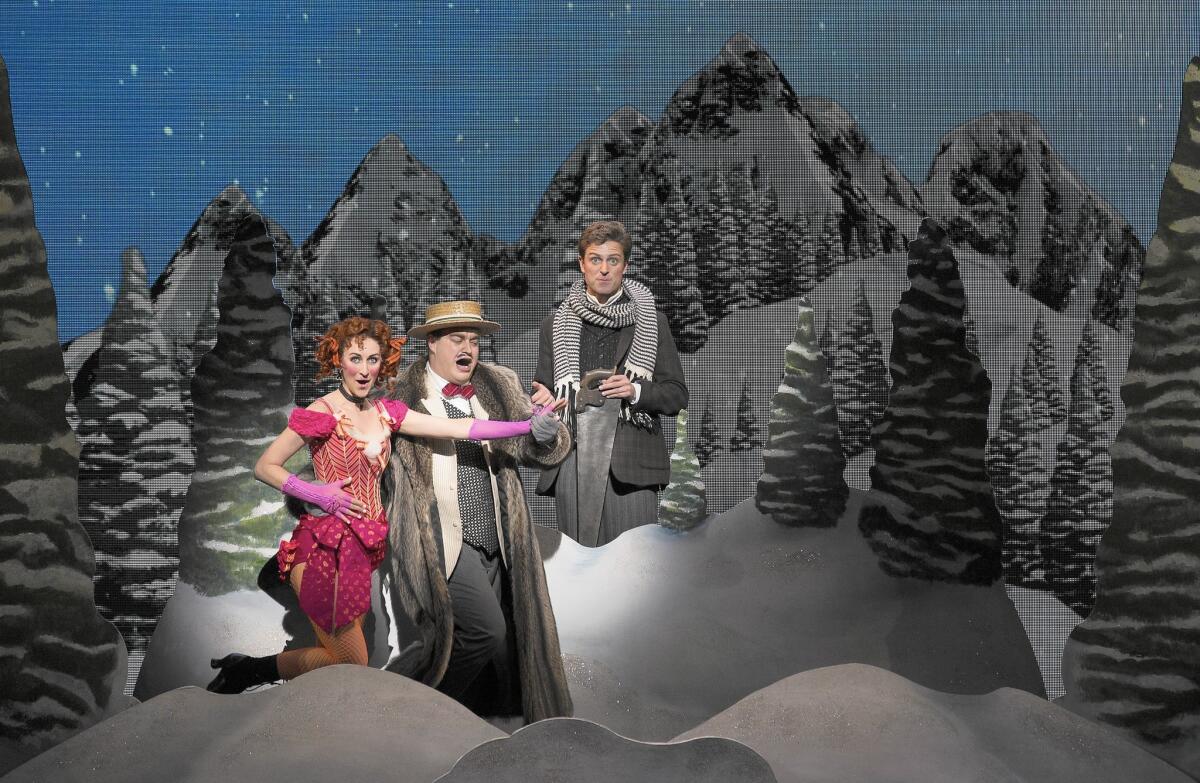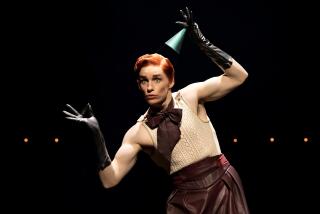Review: ‘A Gentleman’s Guide to Love & Murder’ kills it at the Ahmanson

For “A Gentleman’s Guide to Love & Murder,” homicidal ambition is the mother of musical comedy invention.
This Tony-winning musical, about an acquisitive young man of questionable parentage who is tempted by fate and his own lust for revenge into knocking off the eight relatives who stand between him and the title of Earl of Highhurst, has returned to Southern California for a victory lap.
The touring production that opened Wednesday at the Ahmanson Theatre looks like a million bucks (only fitting for a show about Edwardian aristocrats) and has a refreshingly impish spirit. If the entertainment seems belabored in places, the audacious cleverness of these twisted high jinks never fails to impress.
FULL COVERAGE: Spring 2016 arts preview | Exhibits | Theater | Dance | Pop music | Books
The sleeper hit that wouldn’t quit, “A Gentleman’s Guide” got its start at Hartford Stage before traveling to San Diego’s Old Globe Theatre in 2013. A Broadway run seemed inevitable back then but who could have predicted that a musical based on Roy Horniman’s 1907 novel “Israel Rank: The Autobiography of a Criminal”—the source for the 1949 British movie “Kind Hearts and Coronets”—would have had such enduring commercial appeal?
As crafty as it is unabashed silly, the show, written by Robert L. Freedman (book and lyrics) and Steven Lutvak (music and lyrics), blends lighthearted murderous intrigue with British upper class outlandishness and romantic shenanigans so brazenly self-seeking only a dolt would be left misty eyed.
This flagrant farce has a madcap score that owes a debt to the verbal gamesmanship of Gilbert & Sullivan, the Grand Guignol wit of Stephen Sondheim’s “Sweeney Todd” and both the patter and bustle of Alan Jay Lerner and Frederick Loewe’s “My Fair Lady.”
But the original secret weapon of “A Gentleman’s Guide” was Jefferson Mays, who portrayed with preternatural nimbleness the show’s gallery of snooty eccentrics. (Alec Guinness performed a similar slate of roles in “Kind Hearts and Coronets.”) Metamorphosing like a caterpillar into an array of the most ostentatious butterflies, Mays allowed “A Gentleman’s Guide” to soar on eight pairs of wings.
At the Ahmanson, John Rapson has the quick-change honors. His theatrical characterizations may not be as finely chiseled, but he brings a game spirit to the undertaking and is willing to do just about anything for a guffaw.
The musical’s balance, however, has tilted somewhat in favor of Monty Navarro, played here by a winsome Kevin Massey. Monty is the young man who discovers to his great shock that his unfortunate late mother was disinherited from the highborn D’Ysquith clan for marrying a Castilian musician for love.
Monty learns from an old housekeeper named Miss Shingle (a humorously doughty Mary VanArsdel), who mysteriously turns up at his door after his mother’s funeral, that he is in the line of succession to become Earl of Highhurst. (Antique comedy loves nothing more than to play fast and loose with a protagonist’s identity.)
Fate quickly conspires to make this diffident young man a cold-blooded killer. Sibella (Kristen Beth Williams), the superficial object of Monty’s affections, informs him that she’s marrying someone with wealth and position, though her flimsy heart belongs to him.
And then the overbred D’Ysquiths show their true colors, rejecting Monty’s claim and threatening him with legal action if he harasses them any further. (“A Gentleman’s Guide” is the perfect musical for an age in which one-percenters are the default villains.)
When the Rev. Lord Ezekial D’Ysquith (Rapson donning buckteeth and a parson’s vestment) teeters atop the tower of a cathedral after refusing to help his newfound family member, Monty gets the idea that will propel the action for the rest of the show. The parson’s blood-splattering fall is the first of many murders that will leave the audience howling with laughter.
Darko Tresnjak, who won a Tony for his direction, never lets us forget that we’re in a theater. And how could we with Alexander Dodge’s ravishing set recreating onstage a Victorian-era theater?
The colorful production design is given comic assistance by Aaron Rhyne’s ingenious projections that make untoward death a hoot. Linda Cho’s costumes prevent us from becoming squeamish by turning the D’Ysquiths into eye-catching cartoons.
“A Gentleman’s Guide” might be the closest thing to a puppet show cast with flesh-and-blood human beings. There’s no problem getting into the spirit of the silliness, but a surfeit of plot and musical numbers threatens to turn this operetta into a marathon.
Freedman and Lutvak are endlessly resourceful but certain scenes swell unduly and choruses of songs could be cut for the sake of that all-important consideration in comedy—momentum.
The production looks perfectly at home at the Ahmanson, but some of the lyrics get swallowed in the cavernous house. If Rapson doesn’t quite make the most of Lord Adalbert’s gleeful anthem of aristocratic heartlessness “I Don’t Understand the Poor,” he hits comic pay dirt with effete, scooter-riding Henry’s “Better With a Man,” a ditty that’s more revealing than the character intends.
The show’s most breathlessly exuberant song, “I’ve Decided to Marry You,” is an ingeniously staged number, in which Monty tries to keep his latest love interest, Phoebe (Adrienne Eller), from discovering that his old flame, Sibella, is in the other room. Williams and Eller lend their pretty voices to this brilliantly executed farcical routine in which doorways naturally play a pivotal role.
This is the moment when it becomes apparent that money, even more than murder, is what’s corrupting Monty. The good life that he is starting to enjoy, thanks to the beneficence of a family member who has a change of heart after the loss of his son, leaves Monty not satisfied but more selfish. There’s a moral in this musical caper, but don’t expect any sermonizing from this giddy show.
Massey’s underdog charm keeps us on Monty’s side even as he’s sawing a hole in the ice for
a skating relative and planting real bullets in the prop gun of a diva who stands between him and his coveted earldom. But the real star of this production is Tresnjak’s splendid staging, a valentine to theatrical lunacy, accompanied with a bouquet of winks and a giant box of decadent treats.
More to Read
The biggest entertainment stories
Get our big stories about Hollywood, film, television, music, arts, culture and more right in your inbox as soon as they publish.
You may occasionally receive promotional content from the Los Angeles Times.







